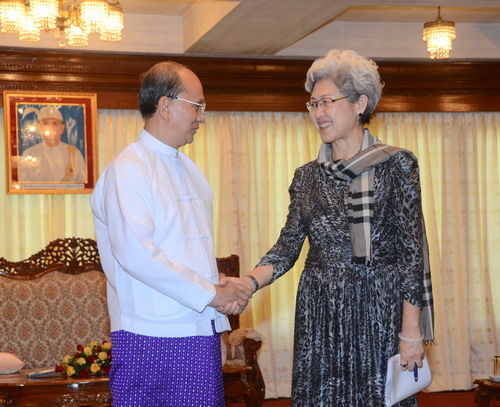China-Myanmar ties unaltered by West's rebranding
- By Xiao An
 0 Comment(s)
0 Comment(s) Print
Print E-mail China.org.cn, January 23, 2013
E-mail China.org.cn, January 23, 2013
 |
|
Myanmar President U Thein Sein (L) shakes hands with visiting Special Envoy of the Chinese Government Fu Ying during their meeting in Yangon, Myanmar, Jan 19, 2013. Fu Ying, who is also Chinese vice foreign minister, arrived in Yangon on Saturday. [Photo/Xinhua] |
Myanmar, a Southeast Asian country that recently took the path of reform, has arisen as a star in the international community.
Myanmar's political advancement, including its urge to reform, internal democratization, and the amelioration of its external environment has pleased China, its neighboring country to the north. Such changes in Myanmar fit China's Myanmar policy as well as China's long term interests.
But there are people who keenly think that such changes in Myanmar and China's interests are contradictory to each other, describing China as the protector of the Burmese dictatorship and a raider of its resources. Such allegations are deceptive, misleading and inflammatory to Burmese who may not know the truth.
The fact is that China and Myanmar have always kept a constructive intergovernmental relationship over the years, during which China has supported Myanmar in developing its economy and in improving its people's livelihoods.
China has encouraged Myanmar to undertake reforms which can allow the Myanmar government to resolve its conflicts with opposition forces and achieve harmonious reconciliation among its ethnic groups.
China also maintains contacts with various parties in Myanmar, including Aung San Suu Kyi, who has recently ascended to international focus. In doing so, China has won understanding and respect from all parties in Myanmar.
In terms of international affairs, China backs Myanmar's effort to be more involved in the ASEAN community.
At the same time, China's investments in Myanmar have drawn much criticism from the West. Some media reports claimed the Myitsone Dam, a China-invested hydropower station still under construction on the Irawaddy River, will only supply electricity to China when it becomes operational in 2017. Other reports said the Sino-Burmese joint venture Leipzig Tong copper mine would result in huge environmental destruction. Some even asserted that China got these contracts by bribing the Burmese military government.
Actually, in spite of some existing problems, the Chinese investments in Myanmar have taken a path of mutually beneficial cooperation, taking into consideration of both the Chinese interests and Myanmar's demand for national development.
In fact, in recent history Western countries led by the U.S. have been hostile to Myanmar, which has been reflected in their foreign policy of isolating and blocking the Southeast Asian country.
Even so, these Western countries still maintain contacts with the Burmese military government and sometimes resort to China to have their message delivered. The U.S. has acknowledged that China's Myanmar-related foreign policies have been reasonable and effective. In Sino-U.S. bilateral talks, Myanmar-related issues are often important topics.
China's support has helped to prevent Myanmar from suffering deeper internal strife, and its people from being overwhelmed by humanitarian disasters – both of which are prerequisites for reform.
Despite this, some Western countries are complacent to attribute recent positive developments in Myanmar entirely to their own efforts, disregarding China's strides to make this happen. They are also trying to exploit Myanmar's reform and include Myanmar in their strategy to contain China.





